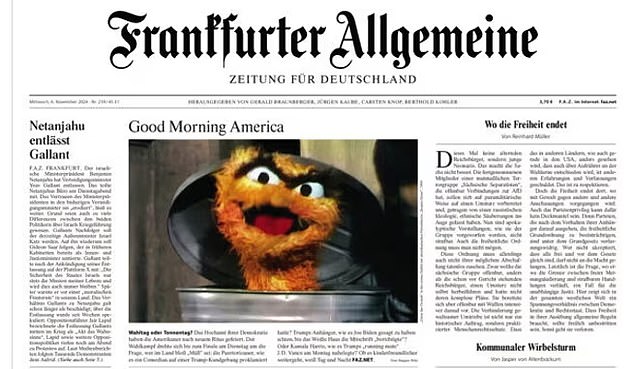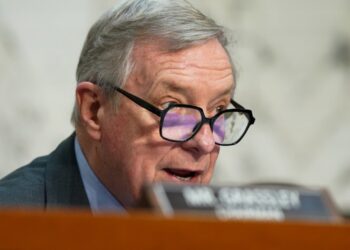Donald Trump‘s dominant victory in the US presidential election over Democratic nominee Vice President Kamala Harris has split opinions and triggered strong reactions from the world’s media.
While one European newspaper represented the new president-elect with an image of Sesame Street character ‘Oscar the Grouch’ emerging from a dustbin coloured orange, others lauded the Republican’s ‘historic’ success at the polls and poked fun at Harris as her bid for the presidency ‘sank into the ground’.
Trump, who at 78 becomes America’s oldest president-elect and the first to ever win re-election after suffering a defeat, pulled out a commanding lead early on as votes trickled in and went on to comfortably secure a second term in the White House.
The first domino fell hours after voting concluded at around 4:30am GMT (11:30pm ET) when North Carolina became the first of the seven battleground states to plump for Trump, awarding all 16 Electoral College votes to the firebrand Republican.
Georgia quickly followed, giving Trump the support of two out of seven swing states as Kamala’s hopes of securing a first presidential term began slipping away.
Upon securing all 19 electoral college votes from lynchpin state Pennsylvania, the Republican candidate jumped the gun and declared victory even before achieving the 270-vote majority needed to seal his next stint in the Oval Office.
That move was seized upon by many outlets across Europe, Asia and the Middle East, while other media organisations chose to highlight the collapse of Harris’ campaign.
Here, MailOnline reviews the global reaction to what is seen by many as the world’s most important political contest.

Germany’s Frankfurter Allgemeine featured a picture of Oscar the Grouch in his original orange colour in a reference to Donald Trump

Norway’s Dagbladet

Italy’s La Repubblica

The Times of Israel
Europe
The possibility of a Trump victory was a divisive topic in Europe.
Many governments and media outlets were wary of the 45th President of the United States also becoming the 47th, primarily over fears he could row back support for Ukraine in its fight against Russia.
There are also concerns over Trump’s attitude to trade deals, given he has floated the idea of a 10% tariff on all goods imported into the US, threatened to impose a 200% tariff on some imported cars, and suggested that the European Union could see even higher duties placed on its goods.
Germany’s Der Spiegel took perhaps the most bleak view of the result, writing that America was ‘on the brink of tipping into authoritarianism’ and claiming Trump had ‘sown hatred’.
Spanish paper El Pais wrote: ‘Trump declares himself the winner’ and quoted a line from his speech in Florida that read ‘we are going to fix everything that is wrong with this country’.
Italy’s La Repubblica, France’s Le Parisien and the Netherlands’ De Telegraaf all went in on Trump ‘self-proclamation’ that he had won the election, explaining how he had told supporters: ‘Thank you for electing me 47th president of the United States’.
De Telegraaf and La Repubblica also pointed out Trump’s high praise of Tesla, SpaceX and X CEO Elon Musk – one of the Republican’s most high-profile supporters.
Musk’s X social media platform is seen as having contributed significantly to the election result, and Trump referred to the South African-born tech mogul as a ‘super genius’ in his premature victory speech.
Critics say it has amplified Republican voices and was used by Musk and associates to promote Trump, while supporters say X is simply acting as a counterweight to the heavily left-leaning American mainstream media.
Prior to Musk’s takeover, the social media platform formerly known as Twitter was accused of suppressing free speech and Republican commentators while preventing the sharing of news stories deemed counter to the Democratic narrative.

Germany’s Der Spiegel

Germany’s Bild

France’s Le Parisien

Russia’s RIA Novosti
Other outlets chose instead to focus on the apparent downfall of Kamala Harris after most polls leading up to yesterday’s election projected a close race that was well within the margin of error.
‘Brutal night for Harris’, Germany’s Bild wrote, as Norway’s Dagbladet piled in with a picture of the Democratic nominee looking defeated with the simple headline: ‘That sunk into the ground,’ above the strapline: ‘The last message from Kamala Harris’ campaign came even before anyone declared Donald Trump the winner.’
Harris’ campaign declared late Tuesday that the Vice President would not be speaking at her official election party until the next day, perhaps in recognition her chances at the White House were dwindling by the minute.
In Ukraine, the homepages of the Kyiv Post and Kyiv Independent both featured several articles about the US election.
The Post led with President Volodymyr Zelensky’s comments in which he congratulated Trump on his election win.
‘We Look Forward to Era of Strong United States,’ he said – a quote that featured at the top of the page on Wednesday morning.
The Kyiv Independent, meanwhile, led with Trump’s claim in his victory speech that he was ‘going to stop the wars’.
Russian news site RIA also chose to focus on Harris’ downfall, building their main article around former Russian president and prime minister Dmitry Medvedev’s comments that the Democrat was ‘finished’.
Finally, as Hungary’s Prime Minister Viktor Orban congratulated Trump on a ‘much-needed victory for the world’, leading political and economic magazine HVG wrote that ‘a golden age is coming’.
Jonathan Portes, Professor of Economics and Public Policy at King’s College London, told MailOnline: ‘If Trump does indeed implement very large across-the-board tariff increases, this will be a severe shock to the global economy, including the UK.
Sam Greene, Professor of Russian Politics at King’s College London, added with respect to Moscow’s war with Kyiv: ‘Ukraine is unlikely to be the most important thing on Trump’s agenda, and he will quickly find himself embroiled in the push and pull of politics in Washington.
‘An abject American capitulation to Russia’s ambitions in Ukraine would, of course, be disastrous to American national security and its broader interests. Whether Trump actually cares about that is a different story.’
Military Sciences Director at the RUSI think tank, Matthew Savill, added: ‘(Trump’s) desire for a deal – and probably a quick one – does not bode well for sustained US support, especially with the current pressure on Ukraine.
‘Trump will have to contend with Congress, but there is significant scepticism about Ukraine amongst many Republicans, and a general US focus towards China.’

Spain’s El Pais

The Netherlands’ De Telegraaf

South China Morning Post

The Japan Times

The Kyiv Post

The Kyiv Independent
Asia
Recent years have seen competition between the US and China across the political, economic, technological and military realms intensify significantly.
Under Trump, this rivalry is expected to heat up even more, with the Republican declaring intentions to dramatically reduce America’s reliance on products manufactured and exported by Beijing.
He has proposed phasing out Chinese imports of goods such as electronics, steel and pharmaceuticals over his four years in office and seeks to implement significant restrictions to crack down on Chinese companies seeking to buy American real estate and invest in energy and tech infrastructure.
Asia’s biggest English-language media outlet, the South China Morning Post, went in on the threat of tariffs, writing that China would ‘serve’ on higher fees for exports and pointing out that Beijing communicated it would ‘respect the choice of the US’ to elect Trump.
China’s Global Times also wrote a single article stating that China’s foreign ministry would ‘handle US ties based on mutual respect and win-win cooperation’ in the wake of Trump’s success.
Elsewhere, the Japan Times said Trump was set to defeat his rival Harris but declined to praise the Republican, adding such a scenario could ‘usher in another era of uncertainty’.
South Korea’s Yonhap news agency focused on Trump’s talking points, lauding his ‘magnificent victory’ and his promise to deliver a ‘strong, safe and prosperous’ America.
Seoul and Washington have collaborated closely in recent years in tech and defence amid the threat of North Korea and competition with China.
India Today, the largest English-language outlet and one of the most widely circulated papers in the most populous country on Earth, appeared to approve of the US election result.
The outlet covered in detail Trump’s victory, lauding the historic nature of his campaign as the oldest president-elect and pointing out that Indian Prime Minister Narendra Modi congratulated his ‘friend’.
Dr Philip Shetler-Jones, RUSI’s Senior Research Fellow for Indo-Pacific Security, told MailOnline how a second Trump presidency could impact the region.
‘A second Trump Presidency will cause concern in the region about disruption flowing from intensification of the ”America first” principle in US trade policy. Economic policy has always been a weakness of the US ‘pivot’ to the Indo-Pacific, and the Trump victory may widen the economic divide across the Pacific.
‘American allies in the region will anticipate renewed pressure to contribute more for their security. Leaders will seek to establish good personal relations with the President elect to make a good case for stable relations, and to control the risk of sharp changes of direction.
‘Competition with China is likely to be the priority of a second Trump term and shape security policy in the region, but the intention will be to avoid conflict under an approach of ”peace through strength”.’

India Today

China’s Global Times

Saudi Arabia’s Al-Arabiya

Iran International
Middle East
The US election comes with the Middle East mired in conflict and concerns that the chaos could soon engulf the entire region.
Israel’s ongoing war with Hamas and other Palestinian militant groups in Gaza and Hezbollah in Lebanon – not to mention the ongoing tensions between Israel and Iran – mean that a Trump presidency could have significant consequences for the regional security landscape.
The Times of Israel reported that Israeli Prime Minister Benjamin Netanyahu hailed Trump’s success after defeat in 2020 as ‘history’s greatest comeback’.
It also wrote about how Trump vowed to ‘stop wars’ rather than start them and said that God had ‘spared his life’ in a recent assassination attempt to ‘restore America to greatness’.
Saudi Arabia’s Al-Arabiya called the former president’s win over Harris a ‘stunning comeback’ and praised Trump’s effort to bounce back after losing out in 2020 to Joe Biden.
Qatar-owned Al-Jazeera followed the tack of many European outlets and chose simply to focus on Trump’s premature declaration of victory – though his presidency has now been confirmed.
In Iran meanwhile, most of the press were reluctant to cover the election at all after Tehran played down the importance of the US election.
At the time of writing, the state-run Islamic Republic News Agency had not published any stories about Trump’s victory, only a small article acknowledging that votes were being counted.
The Mehr news agency meanwhile simply shared an article by US outlet The Hill before going on to publish stories about Iranian satellites coming online.
But opposition news organisation Iran International published a large spread on Trump’s success and highlighted Tehran’s dismissal of the impact the election may have in the region.
‘Although the Biden administration has been unable to rein in Netanyahu’s assertive security policy, a Trump administration will be even more inclined to let him and any incoming prime minister in Israel continue to pursue a military offensive to securitise Israel’s border,’ Dr Zeno Leoni, Lecturer in Defence Studies and Lau China Institute affiliate at King’s College London, told MailOnline.
This can be evidenced by Trump’s support for a US embassy in Jerusalem and for Israel’s settlers to further expand into the West Bank.
‘Given his track record on Iran – he scrapped the Iran nuclear deal – it is unlikely that Trump will seek to prevent an Israel attack on Iran.’







